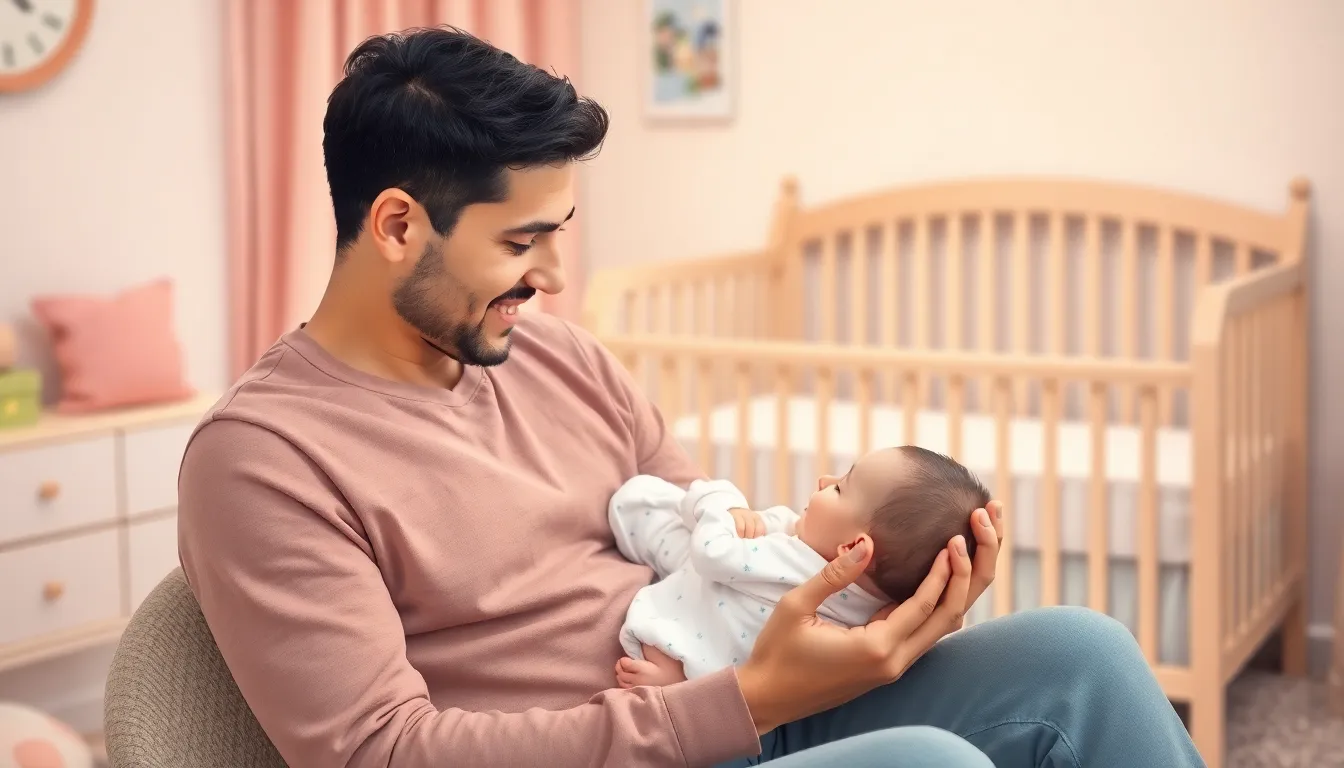Every new parent knows that sleep is a precious commodity, often traded for diaper changes and midnight feedings. But when it comes to sleep training, the question looms: when’s the right time to start? Timing is everything, and diving into the world of sleep training can feel like trying to solve a Rubik’s Cube in the dark.
Table of Contents
ToggleUnderstanding Baby Sleep Patterns
Understanding baby sleep is crucial for parents navigating sleep training. Recognizing sleep patterns paves the way for better strategies and expectations.
Importance of Sleep for Babies
Sleep plays a vital role in a baby’s growth and development. During sleep, the body releases crucial hormones that support physical growth. Cognitive processes also occur, like memory consolidation and brain development. A well-rested baby tends to be more alert, engaging actively with their environment. The National Sleep Foundation recommends that infants aged 4 to 11 months get 12 to 15 hours of sleep a day. For optimal health and development, parents must prioritize quality sleep for their babies.
Common Sleep Challenges
Many challenges can disrupt a baby’s sleep patterns. Frequent night awakenings often frustrate parents, as babies may wake every few hours. Some babies resist sleep due to discomfort or overstimulation, making the transition to sleep difficult. Teething can also cause significant distress, leading to more sleepless nights. Additionally, changes in routine or environment, such as traveling or introducing solids, may impact sleep. Parents often need to identify the cause of these challenges to establish effective sleep training strategies.
When Can You Sleep Train a Baby?

Determining the right time to start sleep training involves understanding your baby’s age and developmental signs. It’s essential to be attentive and responsive to their needs during this time.
Age Recommendations for Sleep Training
Experts often recommend starting sleep training between 4 and 6 months. At 4 months, many babies can develop more regular sleep patterns and tolerate longer sleep durations. The American Academy of Pediatrics states that most infants can sleep without nighttime feedings by 6 months. By this stage, parents find it easier to introduce consistent routines and methods. Waiting until around 6 months allows babies to be more emotionally and physically equipped for training.
Signs Your Baby is Ready
Identifying readiness requires attention to several cues. If a baby can self-soothe, the readiness for sleep training becomes apparent. Signs include reduced night feedings, increased alertness during awake times, and the ability to fall asleep independently during naps. Frequent, consistent sleep disruptions may indicate that a baby is not yet ready. Understanding these signs helps parents choose the right moment for initiating sleep training.
Methods of Sleep Training
Various methods exist for sleep training babies, each catering to different parenting styles and infant needs. Choosing the right approach can enhance a baby’s sleep habits and promote healthy development.
Ferber Method
The Ferber Method involves teaching babies to self-soothe using a graduated approach. For example, parents let their infants cry for specific intervals before providing comfort. Initial intervals may last a few minutes, gradually increasing over time. This structured approach aims to help babies learn to fall asleep independently. Research indicates that implementing this method can lead to improvement in sleep duration and reduced night awakenings within a week or two. Parents often find this technique requires consistency and patience for optimal results.
No Tears Method
The No Tears Method emphasizes gentle techniques without allowing the baby to cry. This method involves comforting the infant until drowsy but awake, helping them transition to self-soothing. Parents may use a variety of strategies like patting, shushing, or picking up the baby when upset. The focus remains on creating a calm and nurturing sleep environment. Initial efforts might take longer than other methods, but many parents appreciate the emotionally supportive nature. According to experts, this approach fosters a secure attachment while promoting healthy sleep habits.
Tips for Successful Sleep Training
Establishing effective sleep training techniques ensures better sleep for both babies and parents. Incorporating specific strategies promotes a smoother transition.
Creating a Consistent Bedtime Routine
A consistent bedtime routine plays a crucial role in signaling to the baby that it’s time to sleep. Activities such as bathing, reading, and soothing music establish predictability. This sequence helps them understand what to expect, creating comfort and security. Aim for a routine lasting between 20 to 30 minutes to facilitate relaxation. Parents can also consider maintaining a similar sleep schedule even on weekends, as regular sleep patterns help reinforce the routine. Consistency in cues promotes better sleep quality for the baby.
Environmental Factors to Consider
Environmental factors significantly influence a baby’s sleep environment. Light levels should be kept low to create a calming atmosphere conducive to sleep. Parents can employ blackout curtains to block external light sources effectively. Noise levels also matter; white noise machines can mask disruptive sounds, promoting a quieter environment. Room temperature should remain comfortable, ideally between 68°F and 72°F, which supports optimal sleep conditions. Lastly, ensuring a safe sleep space with a firm mattress provides additional comfort and security for the baby during sleep.
Sleep training a baby can be a transformative experience for both the infant and the parents. By recognizing the right time to start and understanding the various methods available, parents can set their little ones up for healthy sleep habits. It’s essential to remain patient and consistent throughout the process. With a solid bedtime routine and a conducive sleep environment, parents can help their babies develop the skills needed for independent sleep. The journey may have its challenges, but the benefits of a well-rested baby and family are worth the effort.



